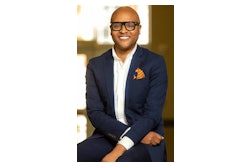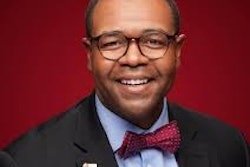While higher education is a path to opportunity — many underrepresented, minoritized students face systemic barriers that make their graduate-level academic experience feel like an uphill challenge. Some barriers can be financial; others can be self-imposed, such as imposter syndrome and the struggle of questioning, “will I be able to measure up?”  Dr. Amanda Wilkerson
Dr. Amanda Wilkerson
Often, the measuring stick is one they have created for themselves. A barrier can also be an invisible standard to which they are held by those who possess individual biases and dispositions that do not support the success of all students. Representation can also be a challenge as a student moves further toward becoming a scholar. Regardless of the obstacle, we must create supportive communities where students can reach their full potential.
As educators, our role in supporting marginalized students and helping them navigate the barriers created by the “system” is crucial. Through mentorship in higher education, we can build supportive communities that empower students to excel rather than allowing obstacles to hold them back.
Throughout my academic journey, I’ve had very different mentors — from clinical to lifeline, including those with diverse backgrounds. As a student mentee, I didn’t want to hear an efficient “yes” or “no” or a detached, “it’s up to you.” I wanted to belong to a supportive community that cared about my concerns and future aspirations. We are not truly vested in a student’s future success if we only provide them with “clinical” mentorship. Instead, we must consider the individual students who come to us for support and ask ourselves, “how can I advocate for them to thrive in academic and professional spaces so that without me, they will still have the fuel to drive their own lifeline?” Lifeline mentorship has the power to shape futures. The feedback I received from my lifeline mentor was not always what I wanted to hear, but it was the honest truth. I value her critiques because they were given from a place of genuine support, and her guidance continues to shape my academic and personal growth.
The Role of a Lifeline Mentor
A mentor’s role is to share knowledge, provide support, and connect students with the resources they need to succeed. However, lifeline mentorship is a complex commitment that you must front-load to achieve the desired outcomes. It is about helping students walk across a bridge where there is tension between their goals and the realities of their academic path. To be an effective mentor, you must know how to apply your support. This begins with listening deeply to your mentees’ needs and determining the best approach to reaching the desired outcome. Should you advocate for them, with them, or behind the scenes? Or is the best approach to encourage them to think through challenges independently by giving them the space to find answers?
You are not fulfilling the mentor role if your approach mirrors the support you received. As mentors, we need to be present and ready to adapt our support as our students’ needs evolve and then figure out how to use our networks to meet those needs. During my first year of teaching, I focused on providing academic support. Then the COVID-19 pandemic hit. In an instant, I needed to pivot and help students navigate an unknown situation and assist them in finding flights home. Today’s students have legitimate questions that are complex and deeply tied to the real-world impact of their work. You must set aside your personal experiences and biases and recognize the unique challenges today’s underrepresented students face, whether academic or otherwise, particularly on topics related to diversity, equity, and inclusion (DEI).
The challenges underrepresented minoritized students face today call for schools of education and the broader education community to make an upfront commitment to building support networks and investing in opportunities for faculty and administrators to sharpen their skills, expand their understanding of the obstacles minoritized students face, and engage in ongoing training. The AACTE Holmes Scholars Program is a powerful testament to what happens when we invest in a problem, provide solutions, and use the best minds and available resources to address it — in this case, supporting the success of minoritized doctoral students.
As a Holmes Scholar, I witnessed how the program provides the full spectrum of scholarly development while asking scholars, “How will you use this experience to plant a seed of support in others?” Often, mentoring relationships are transactional: I give you support, and in return, you succeed. We must shift away from that mindset and move toward something more transformative. If this system helped you, how can you contribute to making it even better? The Holmes Scholars Program fosters this by encouraging scholars to shape the initiatives from which they benefit.
To empower marginalized students to become scholars we must set aside “clinical” mentorship and embrace “lifeline” mentoring, creating a supportive environment that considers the individual student’s needs and goals. We must consistently evaluate what is effective and what is not while focusing on adaptive practices that meet students’ evolving needs. At this moment, when people are walking away from DEI initiatives, we cannot rely on the status quo. We need a steadfast commitment to supporting an inclusive environment that supports the success of underrepresented students on their path to becoming scholars.
Dr. Amanda Wilkerson is an assistant professor in the College of Community Innovation and Education at the University of Central Florida.



















